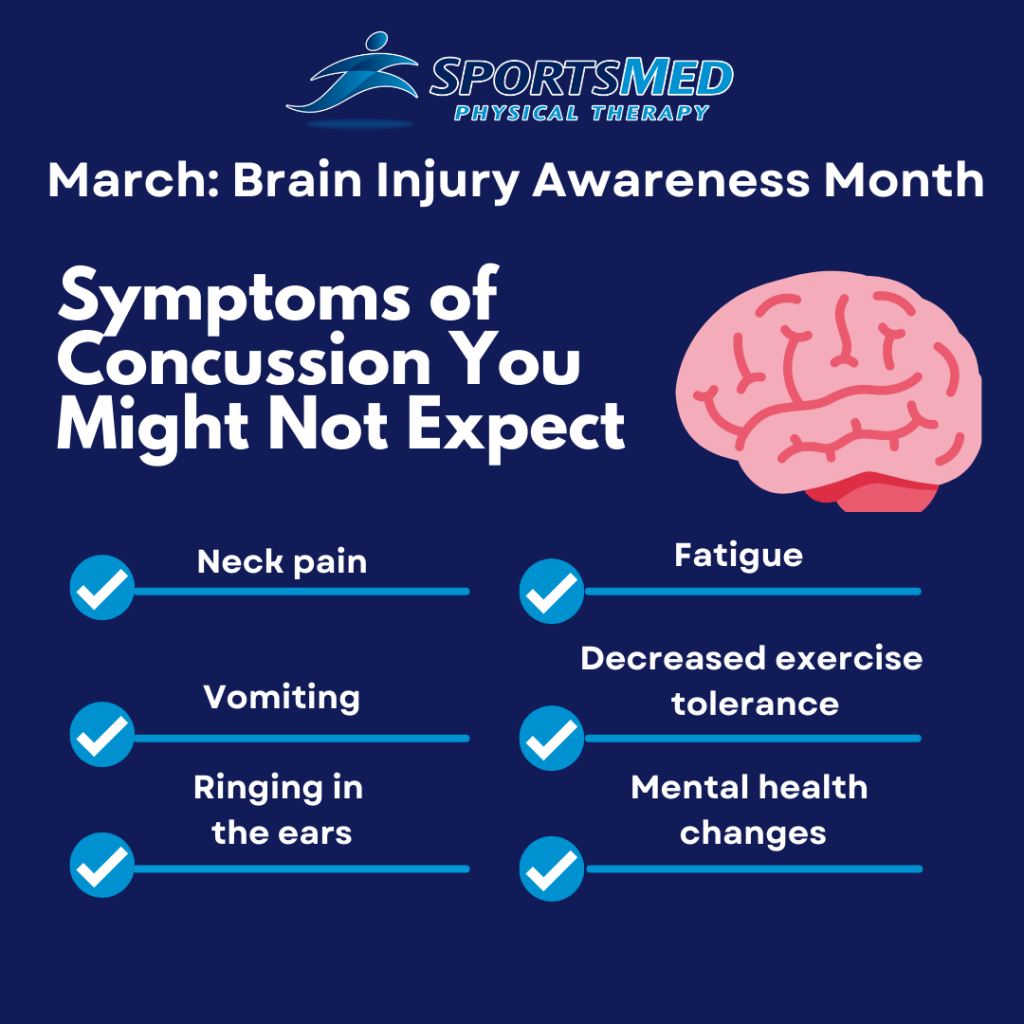March is Brain Injury Awareness Month, although people suffer from the invisible consequences of brain injuries every single day. This month, we are shedding light on common brain injuries and how to treat them, featuring insights from SportsMed physical therapists who specialize in neurological rehabilitation, vestibular rehabilitation, and concussion therapy. This article is written by SportsMed Physical Therapy Newark’s Clinical Director, Dr. Dalton Gilligan, PT, DPT.
Concussions are notoriously under-identified and difficult to treat for a variety of reasons. Poor diagnosis stems from a lack of education regarding symptoms, as well as outdated beliefs and unrealistic expectations preventing athletes from seeking help when injured, such as pushing through pain to continue competing.
Concussions have a wide array of effects on multiple systems and functions in the body. The symptoms can include headache, eye strain, blurry vision, fatigue, dizziness, neck pain, migraines, fatigue, fogginess, memory issues, decreased exercise tolerance, and mental health changes such as increased episodes of anxiety and depression (to name a few).

Proper management after a concussion is paramount; inadequate care early can delay recovery. Diagnosis is symptom-driven. Following impact, CT scans may sometimes be used to make sure no bleeding is present; however, someone with a concussion may have seemingly normal results. Alternatively, concussion tests can be used to assist with diagnosis. These tests include assessments of balance and the Sports Concussion Assessment Tool, also known as the SCAT 5. The SCAT 5 includes a battery of memory recall, cognitive tasks, and symptom lists. (You can take a concussion test online here.)
When dealing with concussions, a thorough physician examination is first necessary to identify the systems affected. This concussion-trained physician, usually specializing in Sports Medicine or Neurology, will direct you to the proper providers; a team of coordinated healthcare practitioners is needed to provide comprehensive concussion therapy. Usually, there will be a physical therapist trained in concussions involved in care. Other members may include an athletic trainer, sports psychologist, ear nose, and throat doctor with a focus on vestibular conditions, a vision rehabilitation specialist, chiropractor, acupuncturist, or nutritionist.
In physical therapy, your practitioner will test your balance, examine your neck, screen the quality of your eye movement, and measure your exercise capacity to find correlations between exertion and symptoms. Visual and vestibular exercises will usually be provided as well. A physical therapist will also be able to answer questions and assist with day-to-day management.

A personalized plan for work, school, and recovery should be established. Symptom exposure should be considered as well. Completely avoiding all activities which cause discomfort – such as bright, busy or noisy environments – can delay recovery, as your brain does not have the opportunity to adapt to these situations. Proper dosing of exposure to these situations should be discussed with healthcare providers in order to help normalize tolerance and allow the brain to adequately recover.
Concussions with protracted symptoms can be frustrating and difficult, however symptoms will improve with personalized treatment, consistent effort, and time. Here at SportsMed Physical, we can help provide treatment that will optimize your recovery.

